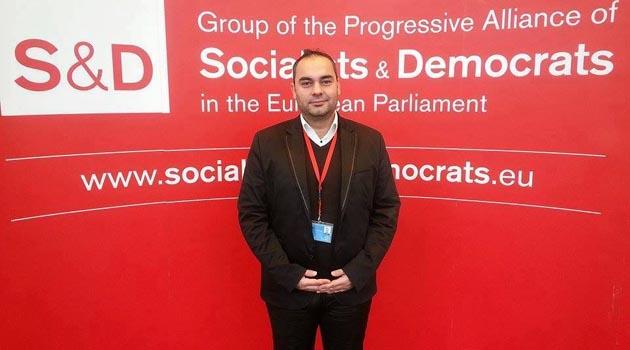Tomáš Ščuka: Unwritten social rules make racism against the Romani minority socially acceptable

As we all well know, the written laws of any country legislate the generally binding rules for behavior in society and are enforceable. There are also unwritten laws, or legal customs, and they are also determined by the rules of behavior through which a society governs itself.
These unwritten rules have arisen spontaneously on the basis of longtime tradition. They are generally accepted both by the public and by the state and its apparatus.
Behavior is transmitted from generation to generation through such unwritten rules. I am of the opinion that we can include antigypsyism, the specific form of racism against Romani people, as part of the unwritten rules that govern society.
Antigypsyism is basically about perceiving Romani people negatively. When you are Roma, it does not matter whether you are working as a ditch-digger, studying at university, or working in high public office.
As a Romani person, you will still be confronted daily with antigypsyism, with having to explain the clichés and prejudices about Romani people that are so strongly engrained in society! Gradually the feeling will arise, when you are Roma, that you personally bear responsibility for anything wrong that happens involving the Romani community.
When you are Roma you are considered automatically responsible for all Romani people in the country through the principle of collective blame. I have not, however, noticed that principle being applied by the majority society to themselves!
To be responsible for oneself and one’s family is what is required of one as a citizen in society. Antigypsyism, however, is such a strongly engrained custom or unwritten norm that it prevents the majority from ever adjusting their a priori negative approach toward Romani people.
If a member of the majority can be found who does not view Romani people as negatively as everybody else, that person will have some explaining to do! In the worst case scenario, whenever anybody attempts to constructively aid the Romani issue, that can negatively influence how that person is perceived by society and even influence their professional life.
A couple of cases of this can certainly be found which I won’t go into here. For the politicians who every once in a while (and there are damned few of them) decide to take a public stance supporting the Romani community, such a stance is a symbol of bravery, given what I have just described, and they risk their careers by doing so.
Support for Romani people has never been, is not now, and (unless something essential changes) never will be a hot topic for politicians at any level! The coexistence between ethnic Romani people and the majority society represents a long-term, unchanging disharmony which unfortunately is just getting worse over time.
It is not necessary to describe here the peculiarities and specifics of this issue and its model situations. We already have online resources that do that here, as well as the contributions of experts and guests at conferences, meetings and seminars about the Romani minority that are constantly repeated without, unfortunately, bringing anything new to this!
Longtime experience has taught us how to predict the content of such events before they even begin. The outcome of this form of hatred is to prevent Romani people from enjoying their basic human rights in society.
All are entitled to those natural rights, no matter what the political will of our legislators is, as they flow from the very nature of what it is to be a human being in society or, if you will, they are given to us by God. Without respecting these rights for all, you can never have equal access to child care, education, employment, housing, etc.
Barrier #1 – legislative change
This growing hatred against Romani people, which has persisted at least since the Second World War, is the main reason non-Romani and Romani coexistence is not improving. To this day the Romani Holocaust has yet to be sufficiently socially acknowledged as a form of wrongdoing due to which Romani people have suffered.
The only possible instrument for improving this situation is the law itself! The political will must be created to strive for legislative changes so that this societally accepted antigypsyism is legally condemned!
The problem is not the finances, but how the solution is approached
Unfortunately, it seems to me that the Czech Republic has been asleep at the wheel and has put too much faith in social work projects which, from the logic of the reality I have described above, will never bring about any change. For more than a decade, social projects have been working without effect here and are clear evidence of this.
Rather, the situation of Romani people is deteriorating from one locality to the next. Even where there are five social assistants per capita the situation has not improved.
On the contrary, in the eyes of the majority society the Romani people are becoming absolutely incapable social invalids. There have been more than enough experiments and innovations of that sort here!
Romani people want equal access to society and a feeling of belonging
For this reason, I am much more in favor of supporting civic and political activism to spark debate and society’s interest in our equal membership in the societies of Europe. I believe today’s young generation can awaken such interest by acting together.
Dialogue is important! In 2015, for example, the European Parliament adopted a resolution on the occasion of International Romani Day about antigypsyism in Europe announcing a memorial day in the European Union for the Roma victims of genocide during the Second World War.
A Romani MEP from Sweden, Soraya Post, is continuing this dialogue through other steps, and I believe she will succeed with all of them. I greatly appreciate her work!
We must, however, acknowledge that the legal acts produced by the European Parliament take the nature of recommendations only to the Member States, and that the final position here on these matters will depend, therefore, on the Czech Goverment. However, I believe that if we draw inspiration from these significant steps by the EU we can contribute to this essential change for a better future.
We Roma should speak out more about what we are experiencing here on an almost daily basis – very often we never pause to talk about this behavior, despite the fact that the injustice bothers us. What we experience is that even when we explain to others what the difference is between “Gypsy” and “Roma”, those who are talking about us still prefer to use the more pejorative term because they are accustomed to it – and in their view that’s just how it should be!
Antigypsyists appeal to all the customary behaviors, positions and usages in this society, ones that are strongly engrained! That is what makes this specific form of racism legitimate in the eyes of society.
